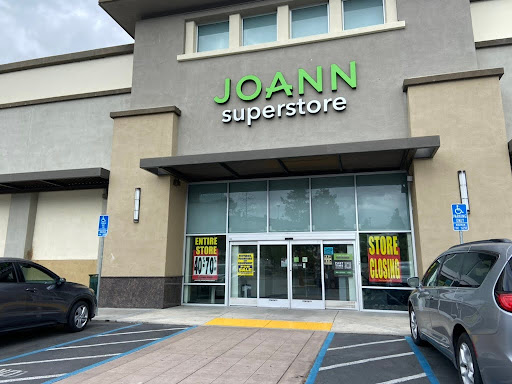On Feb. 23, JoAnn Fabrics, a retailer specializing in fabrics, yarn, sewing materials and other crafting supplies, announced after filing for Chapter 11 bankruptcy that it would begin liquidating its more than 800 stores nationwide. The news came as a jolt to some local employees of the store.
In a company statement, JoAnn cited “significant and lasting challenges in the retail environment” as one of the reasons it went under.
One JoAnn worker in Concord, who preferred to remain unnamed, said she has worked at the company for over five years, and wasn’t made aware of the store’s closure until she saw the news on TikTok.
“The only thing the company offered us was a marginal pay increase to stay on until the store closed for good,” the employee said. The increase of $1 an hour for floor workers was allotted without any clear communication from the store’s new owner about when JoAnn would actually close its doors, she added.
“They’re still shipping us stuff,” the employee said. “They need to empty all the warehouses, so we’re getting all kinds of junk.”
JoAnn isn’t the only beloved retailer in financial straits. Party City and Forever 21 have also filed for bankruptcy, signaling a larger move away from in-person shopping as online retailers occupy a larger share of the economy.
After being in business for over 80 years, JoAnn was purchased on Feb. 26 by the financial services company GA Group, which began the national liquidation process for all JoAnn stores shortly after.
In an interview, Kevin Cabral, president and CEO of the Concord Chamber of Commerce, told The Inquirer what the closure of the historic fabrics and make-it-yourself store means for the community. In addition to the loss consumers will feel, he said, local businesses around JoAnn in the Willow Pass Park-n-Shop will feel an impact as well.
“There are clothing and shoe shops, there’s entertainment down there, and there are great coffee shops,” Cabral said, describing the commercial knock-on effects. “By removing that, people who would stop by to pick up their yarn now aren’t stopping by and grabbing a coffee.”
“Traditional retail shops like JoAnn Fabrics, they’re few and far between,” Cabral added. “It’s a shame they couldn’t figure out a way to make them stay.”
The JoAnn employee in Concord agreed that the store’s disappearance would impact the broader community.
“The people really affected by this closure are the small businesses, cosplayers [who dress up as characters from books and movies], and people who make apparel,” she said. “There are quilt shops all over the place, but for these more specialty fabrics, people don’t have as many options as they had before.”
According to her, customers are shopping more, not less, now that the store will be leaving. “They buy carts and carts of fabric that they usually wouldn’t buy. Our regulars, their shopping habits have definitely changed.”
One frequent JoAnn customer grappling with its closure is Mike Oakes, owner of Buchanan Aviation in Concord and a specialist in aircraft upholstery and interiors.
“If we were busy on a project, we would probably go to JoAnn a couple of times a week. There was a lot of stuff there that we used,” Oakes said. “JoAnn Fabrics, because it was so close to the Concord Airport, was just kind of the go-to place to find whatever it is that we needed.”
“It was a really good resource for us,” he added. “We kind of had taken it for granted.”
Looking at possible replacements, Oakes admitted, “I think the obvious thing that everyone’s leaning toward is Amazon. But that’s difficult.” One reason, he said, is that online shopping doesn’t allow consumers to feel the weight of the fabrics, get an accurate sense of what the colors and prints will look like—or allow for spur-of-the-moment inspiration to hit.
“So many times I was in there without any specific intentions, but we would come out with a basket full of things, going, ‘This is going to help us.’ We didn’t know what we were looking for until we found it.”
Broadly, Oakes said he doesn’t just view JoAnn as a shopping destination, but a “landmark.”
“It’s just part of our culture,” he said. “For me, it’s like McDonald’s. It’s like Home Depot. It was always there when we needed it.”
In response to the closure, Concord’s Chamber of Commerce president urged consumers to play a larger role in helping keep businesses alive in their community—by voting with their dollars.
“If you know of businesses in your neighborhood, support them,” Cabral said, whether it’s fabrics or otherwise. In the end of the day, he added, it’s about making a “conscious effort to shop locally.”











































































